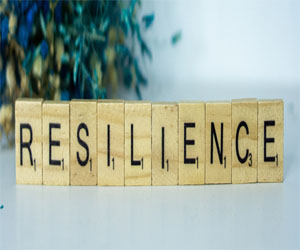

Effective Strategies For Navigating Life's Challenges

Resilience is a crucial skill that empowers individuals to overcome adversity and thrive in the face of life's difficulties. Whether you're facing personal setbacks, professional challenges, or broader societal crises, resilience strategies can make a significant difference in how you respond to and bounce back from these obstacles. In this article, we explore effective strategies for building and strengthening resilience.
Resilience Defined
Resilience is the ability to withstand, adapt to, and recover from challenging situations. It involves mental and emotional flexibility, as well as a positive outlook on life. It's not a fixed trait but rather a set of strategies that can be cultivated and refined over time.
Effective Resilience Strategies
Develop Emotional Intelligence: Emotional intelligence involves understanding and managing your emotions effectively. It's a foundational skill for resilience, as it allows you to navigate challenging situations with self-awareness and emotional control.
Maintain A Growth Mindset: A growth mindset is the belief that you can learn and grow from experiences, including failures. Embrace challenges as opportunities for growth rather than setbacks, and you'll be better equipped to bounce back.
Cultivate Social Connections: Building a strong support system is vital for resilience. Nurturing positive relationships with friends and family provides emotional support, encouragement, and a sense of belonging during tough times.
Practice Self-Care: Taking care of your physical and mental well-being is essential. Regular exercise, proper nutrition, and adequate sleep contribute to your resilience by strengthening your body and mind.
Set Realistic Goals: Break down your long-term goals into smaller, achievable steps. This approach fosters a sense of accomplishment and progress, boosting your self-esteem and resilience.
Embrace Problem-Solving: Resilient individuals focus on solutions rather than dwelling on problems. When faced with challenges, assess the situation, identify possible solutions, and take action.
Mindfulness And Stress Management: Mindfulness techniques, like meditation and deep breathing, help you manage stress and anxiety. They promote emotional regulation and a sense of calm in the face of adversity.
Learn From Adversity: Every setback provides an opportunity for learning and growth. Reflect on past challenges and the lessons they've taught you to build resilience.
Positive Self-Talk: Replace negative self-talk with self-compassion and optimism. Treat yourself with the same kindness and encouragement you would offer a friend.
Seek Professional Help: If you find it challenging to navigate adversity on your own, don't hesitate to consult a therapist or counselor. They can provide guidance, tools, and strategies to enhance your resilience.
The Impact Of Resilience Strategies
Implementing resilience strategies can have a profound impact on your life. You'll find yourself better equipped to cope with setbacks, stress, and change. Resilient individuals tend to experience:
Improved Mental Health: Lower levels of depression, anxiety, and stress.
Increased Adaptability: A more open and flexible approach to change.
Enhanced Problem-Solving Skills: The ability to find solutions and seize opportunities.
Greater Confidence: A stronger self-belief and self-esteem.
Stronger Relationships: Deeper and more fulfilling connections with others.
Optimism And Hope: The ability to maintain a positive outlook even in challenging circumstances.
Building resilience is a lifelong journey, and these effective strategies can help you navigate the inevitable ups and downs of life with greater strength and grace. By embracing emotional intelligence, a growth mindset, and a robust support system, you can fortify your resilience and emerge from challenges with a sense of accomplishment and growth.
A Natural Path To Wellness
 The Power Of Aromatherapy
The Power Of Aromatherapy
Aromatherapy, the practice of using essential oils for therapeutic purposes, is grounded in the belief that our sense of smell is intrinsically connected to the brain's limbic system, the region responsible for emotions and memory. The aromatic compounds found in essential oils can influence our mood, thoughts, and feelings, making them a potent tool for supporting mental health.
Mood Elevation And Stress Reduction
Several essential oils are well-known for their mood-enhancing and stress-reducing properties. Oils like lavender, chamomile, and bergamot are celebrated for their ability to promote relaxation, reduce anxiety, and foster emotional well-being. Diffusing these oils in your living space or adding a few drops to a warm bath can provide immediate relief from stress and contribute to a more positive mood.
Emotional Balance
Emotions often take center stage in discussions of mental health. Essential oils can help restore emotional equilibrium, alleviating feelings of sadness, irritability, and restlessness. Scents like rose and ylang-ylang are celebrated for their mood-lifting and calming effects, offering a natural means to enhance emotional well-being.
Enhancing Cognitive Function
Mental health is not only about emotions; it also encompasses cognitive function and clarity of thought. Certain essential oils can support mental focus and reduce mental fatigue. Oils like peppermint and rosemary are particularly effective in improving cognitive function. Inhaling these invigorating scents or incorporating them into your workspace can enhance your mental clarity and decision-making abilities.
Holistic Well-Being
Essential oils provide a holistic approach to supporting mental health, addressing both emotional and cognitive aspects of well-being. Whether you are dealing with anxiety, mood swings, or simply seeking to improve your cognitive abilities, these natural remedies can play a crucial role in maintaining mental health.
Simplify Your Culinary Journey
 The Benefits Of Easy Cooking
The Benefits Of Easy Cooking
Time-Saving: Easy cooking methods typically save time, making them ideal for busy individuals or families. You can whip up a delicious meal in a short amount of time.
Cost-Effective: Many easy cooking techniques use affordable ingredients and require fewer kitchen gadgets. This can lead to cost savings in your grocery bill and reduce the need for specialized equipment.
Reduced Stress: Cooking shouldn't be a source of stress. Easy cooking emphasizes simplicity and minimizes the complexity of meal preparation, resulting in a more relaxed experience.
Healthy Choices: You can create nutritious and balanced meals using easy cooking methods. By choosing fresh and whole ingredients, you'll be more likely to make health-conscious choices.
Tips For Easy Cooking
Plan Your Meals: Start by planning your meals in advance. Create a weekly menu, so you know exactly what you'll be cooking each day. This can save you from last-minute meal dilemmas.
Embrace One-Pot Dishes: One-pot meals are a fantastic way to minimize cleanup and streamline cooking. Dishes like soups, stews, and pasta make meal preparation quick and easy.
Fueling Your Health And Well-Being
 Understanding Eating Habits
Understanding Eating Habits
Eating habits are the routines and behaviors associated with our food consumption. These habits encompass not only what we eat but also how we eat, when we eat, and why we eat. They are shaped by various factors, including cultural, social, emotional, and environmental influences. Our eating habits are a reflection of our relationship with food, and they can have both positive and negative consequences.
The Impact Of Eating Habits
Nutritional Health: Eating habits directly affect our nutritional health. A balanced diet that includes a variety of nutrients is essential for the proper functioning of our bodies. Healthy eating habits can reduce the risk of chronic diseases and promote overall wellness.
Weight Management: Our eating habits have a significant impact on weight management. Overeating, frequent snacking, or consuming unhealthy foods can lead to weight gain and obesity, while mindful eating and portion control support weight maintenance.
Mental Health: Eating habits are linked to mental health. Emotional eating, stress eating, and disordered eating patterns can negatively affect our emotional well-being. Conversely, a balanced diet with the right nutrients can support mental health and cognitive function.
Energy Levels: The foods we consume can impact our energy levels. Poor eating habits, such as consuming sugary or processed foods, can lead to energy spikes and crashes, while a diet rich in complex carbohydrates, protein, and fiber provides sustained energy.
Digestive Health: Eating habits also influence digestive health. Consuming fiber-rich foods, staying hydrated, and practicing portion control contribute to a healthy digestive system and prevent issues like constipation or indigestion.
Cultivating Healthy Eating Habits
Mindful Eating: Pay attention to what you eat and how it makes you feel. Eat slowly, savor each bite, and listen to your body's hunger and fullness cues.
 Mindful Breathing: Conscious breathing is at the heart of mindfulness. Paying attention to your breath can instantly bring you into the present moment and help alleviate stress.
Mindful Breathing: Conscious breathing is at the heart of mindfulness. Paying attention to your breath can instantly bring you into the present moment and help alleviate stress.
Observation Of Thoughts: Mindful living entails observing your thoughts as they arise, acknowledging them, and then gently letting them go, rather than becoming entangled in them.
Savoring Experiences: It encourages you to savor the simple joys of life - from the taste of your morning coffee to the warmth of the sun on your skin.
The Stress-Reducing Benefits Of Mindful Living:
Stress Management: By cultivating mindfulness, individuals can better cope with stress. It helps them break free from the cycle of worry and rumination, providing a sense of calm and relaxation.
Improved Emotional Well-Being: Mindful living promotes emotional balance and resilience. It allows individuals to observe their emotions without reacting impulsively, fostering emotional stability.
Better Physical Health: Reduced stress through mindful living can have positive effects on physical health, including lowered blood pressure and improved immune function.
Enhanced Relationships: Mindfulness can lead to better relationships. By being fully present and engaged in your interactions, you can deepen your connections with others.
Increased Productivity: Mindful living can also boost productivity by allowing you to focus on one task at a time and reduce distractions.
 Chamomile: Chamomile is perhaps one of the most well-known herbs for stress relief. Its gentle, soothing qualities can help calm the mind and relax the body. Chamomile tea is a popular choice, but it's also available in the form of supplements or essential oils.
Chamomile: Chamomile is perhaps one of the most well-known herbs for stress relief. Its gentle, soothing qualities can help calm the mind and relax the body. Chamomile tea is a popular choice, but it's also available in the form of supplements or essential oils.
Lavender: Lavender's delightful aroma is not just pleasant; it has calming properties that can reduce anxiety and stress. You can use lavender essential oil in a diffuser, add a few drops to your bath, or even apply it topically.
Valerian Root: Valerian root is known for its sedative effects and is often used to improve sleep quality. Better sleep can significantly reduce stress. It's available as a supplement or in herbal tea blends.
Ashwagandha: Ashwagandha is an adaptogenic herb that can help the body better manage stress. It supports the adrenal glands and promotes a sense of calm and relaxation.
Passionflower: Passionflower is a traditional remedy for anxiety and nervousness. It can help relax the mind and ease tension.
Rhodiola: Rhodiola is another adaptogenic herb that can enhance the body's response to stress. It may also improve mental and physical performance during stressful periods.
Ginseng: Ginseng is an adaptogen that can improve the body's resilience to stress. It's available in different forms, such as Asian ginseng or Siberian ginseng.
Lemon Balm: Lemon balm has a mild sedative effect and can promote relaxation. It's often consumed as a tea or used as an essential oil.
A Journey To Authentic Self
 The Importance Of Reconnection
The Importance Of Reconnection
In today's world, external influences can often lead us away from our authentic selves. We may find ourselves trying to conform to societal norms, meet the expectations of others, or follow trends that don't resonate with our true desires. This can result in feelings of disconnection, inner conflict, and a lack of fulfillment.
The Journey To Reconnection
Reconnecting with your essence is a transformative journey. It involves the following steps:
Self-Exploration: Begin by asking deep and meaningful questions about who you are and what truly matters to you. Self-reflection is a powerful tool in understanding your essence.
Identify Your Values: Your values are the core principles that guide your life. Recognizing and living in alignment with your values is essential to reconnecting with your essence.
Let Go Of External Expectations: Release the need to conform to societal or external expectations. Allow yourself to be who you are without fear of judgment.
Nourishing Your Way To Restful Nights
 Almonds: Almonds are a good source of magnesium, which plays a role in supporting deep sleep. A magnesium deficiency may lead to restless sleep and insomnia. Consuming almonds can help regulate sleep patterns.
Almonds: Almonds are a good source of magnesium, which plays a role in supporting deep sleep. A magnesium deficiency may lead to restless sleep and insomnia. Consuming almonds can help regulate sleep patterns.
Fatty Fish: Salmon, mackerel, and trout are high in omega-3 fatty acids, which can help regulate the body's production of melatonin. These healthy fats can promote a more restful night's sleep.
Leafy Greens: Leafy greens like spinach and kale are rich in calcium. Calcium plays a crucial role in helping the brain use tryptophan to produce melatonin. Incorporating these greens into your diet can support melatonin production.
Warm Milk: A classic remedy for better sleep, a warm glass of milk provides a source of tryptophan and can be soothing before bedtime.
Whole Grains: Whole grains like oats and brown rice have a low glycemic index, which means they release energy slowly. This helps stabilize blood sugar levels and can prevent nighttime wake-ups due to blood sugar fluctuations.
Honey: Honey contains a small amount of tryptophan and has a natural ability to promote relaxation. Adding a teaspoon of honey to a cup of herbal tea can be a comforting bedtime ritual.
Herbal Teas: Herbal teas like chamomile, valerian root, and lavender are known for their calming effects. They can help reduce anxiety and induce a more peaceful sleep.
Walnuts: Walnuts are a source of melatonin, which can be beneficial for regulating sleep patterns. Consuming a small handful of walnuts before bed may promote better sleep.
It's important to note that while incorporating these superfoods into your diet can support better sleep, they are most effective when part of a balanced diet. Moreover, eating too much of certain foods, especially close to bedtime, can disrupt sleep patterns, so moderation is key.